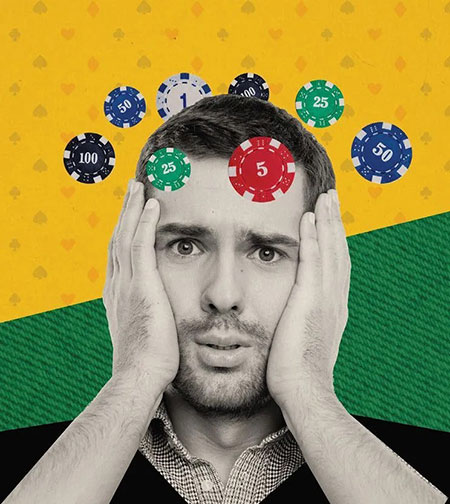SO YOU THINK YOU’RE UNLUCKY?
Let’s talk about that…
By Al O’Grady
 As a dealer, I hear all kinds of emotional reactions when people lose. Some are true class acts. They understand basic strategy and know the game, but for whatever reason, it just wasn’t in the cards (pun intended). Then there are the others—immature, tantrum- throwing babies. They slam the table, turn the f-word into a noun, verb, adjective and adverb, and sulk away like a 6-year-old in desperate need of a timeout.
As a dealer, I hear all kinds of emotional reactions when people lose. Some are true class acts. They understand basic strategy and know the game, but for whatever reason, it just wasn’t in the cards (pun intended). Then there are the others—immature, tantrum- throwing babies. They slam the table, turn the f-word into a noun, verb, adjective and adverb, and sulk away like a 6-year-old in desperate need of a timeout.
Some players are convinced the game is rigged, despite never having taken the time to learn even the basics of blackjack. And then there’s my personal favorite: the ones who complain about how unlucky they are. Really?
So, what exactly is your definition of luck? Personally, I find that a tough question. I’ve never been satisfied with the dictionary definition. According to Dictionary.com, luck is defined as: “The force that seems to operate for good or ill in a person’s life, as in shaping circumstances, events, or opportunities.” But this definition leaves me with more questions than answers. What is this force? Who—or what—is behind it? How is it measured, and why does it seem to affect some people more than others?
It sounds more like something out of the spiritual realm than anything grounded in reality. And let’s be honest—I highly doubt the universe or any celestial being cares whether you win or lose a hand of blackjack. So no, that definition doesn’t quite cut it. My search for a better explanation continues.
The second definition from Dictionary.com hits a little closer to home. It defines luck as: “good fortune; advantage or success, considered as the result of chance.” This version is more relevant to the discussion, but I still take issue with it. What exactly is “good fortune”? How do you define “success”? These are subjective terms, open to interpretation—and that leaves me wanting more clarity.
So, forget the dictionary definitions. How would you define luck?
As a self-proclaimed math geek, I define luck as this: an intangible factor that influences short-term deviations—positive or negative—from long-term probabilities. For example, if there’s an 80% chance of something happening and you bet on it but lose, is that unlucky? No. If something has an 80% probability, you also have to accept that it won’t happen 20% of the time.
Now let’s say you make the same bet twice in a row and lose both times. Is that unlucky? The chance of that happening is 4% (20% × 20%). It’s improbable—but not impossible. I wouldn’t call that “unlucky,” just unlikely.
But what if you lose three times in a row on that 80% bet? That’s a 0.8% probability. Now, some might start crying “bad luck,” and emotionally, I might even agree. But the logical side of me argues: it’s still within the realm of mathematical possibility. It’s rare, but not impossible.
People are often irrational when it comes to probability. They dismiss remote chances as “bad luck,” especially when those odds turn against them. They develop a sense of entitlement. “I was the heavy favorite—I deserved to win.” When they don’t, they look for something or someone to blame. And the easiest scapegoat? Luck.
But here’s the flaw in that logic: there are no guarantees in life—except death and taxes. And certainly, there are no guarantees in a casino. Like Murphy’s Law says, “Anything that can go wrong, will go wrong.”
Then there’s the self-fulfilling prophecy—the power of suggestion. If you keep telling yourself that you’re unlucky, it becomes your truth. You lose your splits and double downs and reinforce the belief that you’re cursed. But what if you made those plays against basic strategy? Was that really bad luck—or just bad play? You can’t blame luck for poor decision-making.
The reverse is also true. Let’s say you win your splits and double downs and feel “lucky”—but in reality, you followed perfect strategy. Was that luck, or was it skill?
People form a mindset and let it dictate their play. They let subjectivity override objectivity and then use that same subjectivity to explain the results.
Some believe superstitions determine their fate—walking under a ladder, breaking a mirror or a black cat crossing their path. They let these beliefs influence their actions. They play conservatively, avoid splitting or doubling when they should, and walk away with subpar results. Was it the superstition that caused the loss, or their unwillingness to make the right moves? In other words, correlation is not causation.
There’s another saying I like when it comes to luck: The harder I try, the luckier I get. These people don’t leave outcomes to chance. They focus on preparation, learning, practice, planning and persistence. Whether in blackjack or life, positive results tend to follow effort—not divine intervention.
Which leads me to one final thought. Winners often credit their good luck—even when luck had nothing to do with it. Losers often blame their bad luck—again, even when it had nothing to do with it.
But just in case I’m wrong, I sincerely wish you the best of luck at the tables… and don’t forget to tip the dealer.
Al O’Grady has been a blackjack dealer for over seven years. He is a freelance writer with an economics degree and is currently pursuing a degree in mathematics.


